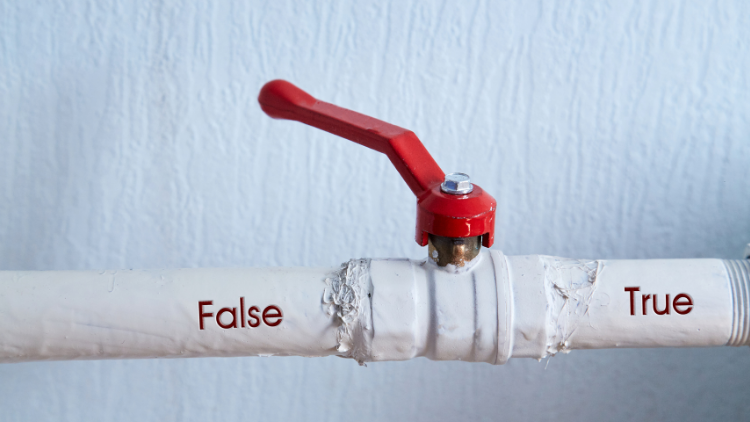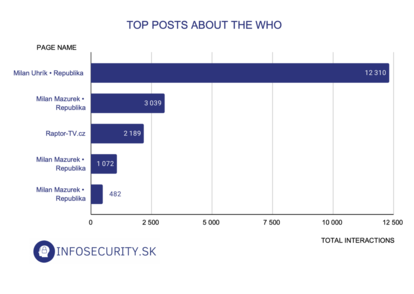DISINFORMATION
Disinformers are criticising the EU’s decisions to advance accession negotiations with Ukraine, the WHO is being labeled as a “dictatorship”

- The WHO is negotiating the "Pandemic Treaty" to enhance global readiness for future pandemics, but far-right parties, like Slovakia's Republika, criticise it as a threat to human rights and national sovereignty.
- Pro-Kremlin actors continue to spread false narratives, claiming EU sanctions against Russia are ineffective and harmful, using misleading information to create distrust and discord.
- Opposition from pro-Kremlin sources to the EU's decision to open accession negotiations with Ukraine includes labelling Ukraine a "failed state" despite positive indicators in corruption perceptions and democracy rankings.
Far-right actors target the WHO and the “Pandemic Treaty”
In the event of another pandemic, the World Health Organization (WHO) is working on an international agreement to ensure the resilience of its member states as well as to prevent another global crisis. The instrument, which is being negotiated by WHO countries, aims to improve global prevention, preparedness, and response to future pandemics.
The so-called “zero draft” of the treaty is currently a point of discussion among the members. This prompted some actors in Slovakia, primarily far-right political parties, to criticise the measure and spread fear regarding the treaty. This mainly concerns Slovak parties who have previously spread COVID-19 disinformation and, to some extent, built their support base on their opposition to pandemic measures.
The members of the far-right Republika party were the most active in this topic. Chairman of the party and an MEP, Milan Uhrík, posted a video on his official Facebook page urging the new government to reject the new version of the International Health Regulations (IHR), which are supposed to be accepted by the countries before the “Pandemic Treaty”. In the video, Uhrík calls the WHO “globalists” and says that the measures “impose the globalist WHO's brutal control over the people of the world”. He also suggests that the WHO is controlled by Bill Gates through his foundation. Disinformation site InfoVojna (“InfoWar”) also called the treaty a “dictatorship of the WHO”.
In the same post, Milan Uhrík also claims that the IHR does not respect human rights in any form, claiming that “why is there a need to respect any human rights and dignity? They need to treat people like cattle, just like they did during COVID-19”. Another member of the party, Milan Mazurek, re-shared the post and wrote: “If the new government doesn't stop this, we could be facing the complete loss of our human rights!”
As it turns out, concerns about the question of human rights in the draft “Pandemic Treaty” are not unjustified. Some international human rights organisations such as Human Rights Watch and Amnesty International have pointed out that “the current draft of the treaty includes only limited references to existing human rights obligations and compliance provisions”. Therefore, they urged the member states to push for clear commitments to human rights protections in the text of the treaty.
However, the rhetoric that the actors mentioned above are using is unjustifiable. Calling these concerns a “complete loss of human rights” or “treating people like cattle” is not only false but also highly misleading to the public, which then results in widespread fear among the public.
Furthermore, when speaking about the “Pandemic Treaty” in general, it is crucial to state that, as with all international agreements, its final form will be decided by sovereign states, led by their governments. Any measures will, therefore, have to be approved, taking into account the national laws and regulations of all countries. Therefore, claiming that the WHO are “globalists” who want to “control humanity” or rob the member states of their sovereignty is false.
Since posts about the WHO were prevalent in Slovak information space in the past two weeks, we also looked at the topic through an optic of a list of disinformation actors in Slovakia. We used the CrowdTangle analysis tool to analyse the most popular posts on Slovak Facebook that include the keywords “WHO” and “International health regulations”. Posts were evaluated based on the total number of interactions (the sum of all reactions, comments, and shares).

The first place belongs to the aforementioned video by Milan Uhrík, in which he claims that the WHO wants to “impose brutal control over the people of the world”.
The second place belongs to a post made by Milan Mazurek. In the Facebook post, he claims that the regulations of WHO mean the “end of freedom” and also warns the public that the freedom of Slovak citizens “hangs by a thread”. This is just another example of the aforementioned tactic of inciting fear and the sense of urge to oppose the organisation.
The next place belongs to a post published by a disinformation site Raptor-TV.cz. Even though the site is predominantly Czech, posts mentioning the WHO treaty were produced in the Slovak language. The post shows a demonstration against the new measures that took place in Budapest with the caption, “Let’s stop the insidious dictatorship of the WHO!”.
In another post, Milan Mazurek urges the Slovak government to “stop the WHO treaty”.
The last place belongs to the aforementioned post by Milan Mazurek, in which he re-shared Uhrík’s video and added that the measures are a “complete loss of human rights”.
Pro-Russian actors are still disinforming about sanctions
In response to Russia’s unprovoked and illegal invasion of Ukraine in February of last year, the EU has imposed successive rounds of sanctions against Russia, aiming to thwart the country’s ability to continue the aggression effectively. Ever since their introduction, the vast network of pro-Kremlin actors has been producing disinformation and conspiracy theories with the goal of sowing discord and giving the impression that sanctions are ineffective.
The EU is currently discussing the adoption of a 12th round of sanctions against Russia, which would include export restrictions and target $5.3 billion in trade. As soon as the news got out, pro-Russian actors started repeating all the already-known false narratives about sanctions. The most widespread claim is that the sanctions are ineffective, illogical and hurting European citizens.
Despite the fact that these narratives were already widespread in the Slovak information space last month, they are still very prominent. This is particularly fostered by the Russian Embassy in Slovakia, which produces a large amount of content in connection with the sanctions. In one of its posts, the Embassy states that “it is very difficult to comment on sanctions because they lack a rational basis”. In another post, they make a claim about how much money the EU is losing because of the sanctions while completely omitting their tangible impact on the Russian economy.
The same talking points were then adopted by pro-Russian disinformation sites. The Facebook page of Bádateľ, a disinformation website notorious for spreading dangerous conspiracy theories, mocked the sanctions: “It's been over a year since Leyen's speech about Russia pulling chips out of refrigerators. Today, the EU is in recession, and Russia is growing.”
The increased frequency of such content in the information space is a direct response to the announcement of further sanctions. The narrative that sanctions are ineffective and hurt the EU more than Russia is entirely false and has already been refuted several times. As it is apparent from the examples mentioned above, a tactic that is often used by pro-Kremlin actors is to portray sanctions as an idea that is so 'ridiculous' it could never work. In this way, they try to convince the public that imposing further sanctions is counterproductive, even downright illogical. In reality, however, they are trying to hide their real impact and sow distrust regarding the measures, thus creating a rift between the EU and its Member States.
Disinformers are criticising the EU’s decisions regarding Ukraine’s membership status
Pro-Russian actors, in alignment with the rhetoric of the Kremlin, have always dismissed any indication that Ukraine could be moving closer to Western structures. Recently, the EU has adopted new enlargement reports, which highlight the European Commission’s recommendation to open accession negotiations with Moldova and Ukraine. This decision met with a backlash from pro-Kremlin actors, who criticised both the EU and Ukraine.
One of the most well-known disinformation sites in the Slovak information space Slobodný vysielač (“Free broadcaster”) has shared a video of Hungarian Foreign Minister Péter Szijjártó, who criticised the decision to advance in the accession process with Ukraine and claimed that “the evaluation finds that Ukraine does not meet the conditions for EU membership”. Furthermore, disinformation site Bádateľ expressed dissatisfaction with the entire process, criticising the fact that Slovakia has to aid Ukraine to advance in the accession talks. The site also proceeded to ask its followers “why should we finance a failed state?!” referring to Ukraine.
Calling Ukraine a “failed state” has been a modus operandi of disinformation actors even long before the war. Pro-Kremlin sources frequently cast doubt on Ukrainian statehood, claiming that Ukraine either does not exist as a state or is about to collapse. The arguments for this narrative are diverse, ranging from the economic state of the country to corruption.
When it comes to the latter, according to Transparency International's Corruption Perceptions Index 2022, Ukraine ranked 116th out of 180 countries, with a score of 33 out of 100. Compared to 2021, Ukraine has improved its position by one place and one point. Even though the progress is slow, the overall trend in Ukraine is positive. Russia ranked 137th in the same Index.
In the Democracy Index 2022, which ranks countries from 0 (least democratic) to 10 (most democratic), Ukraine got a score of 5.42. To draw a comparison, some of the EU member states ranked as low as 6.45. Russia was among the worst-ranked countries, with a score of 2.28.
Ukraine is not a failed state, as pro-Kremlin actors frequently assert. However, Russia's acts of armed aggression violate Ukraine's sovereignty and territorial integrity, directly attempting to hinder its capabilities to govern its own state. Finally, it is important to mention that the EU membership negotiations take years to produce a result. The future member country has to undergo many reforms to be eligible to join, and the EU and its member states also have to prepare to facilitate the accession. The process is highly complex and the positive signals sent by the EU in the form of advancing formal negotiations do not mean Ukraine is joining the Union in the upcoming months, even though pro-Kremlin actors present it that way.
Project Infosecurity.sk organized by Adapt Institute, which is supported by the Prague office of the Friedrich Naumann Foundation for Freedom, continuously monitors the activities of both Slovak and foreign disinformation actors, but focuses mainly on the former. The project activities are built upon daily monitoring of emerging disinformation, hoaxes, and conspiracy theories in the online information space. This approach allows the analysts to identify disinformation posts and narratives that resonated with the public the most, as well as to find out where they originated, and how they spread and evolved on social media. The report takes the form of a bi-weekly summary of arising trends in the spread of malicious information content online. Based on that, Infosecurity.sk can warn the public about emerging and current trends in the field of disinformation, manipulation, and propaganda.

